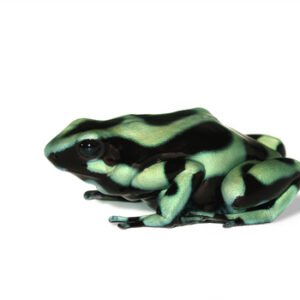Dendrobates auratus
Understanding the Dendrobates Auratus Frog
The Dendrobates Auratus frog, commonly known as the poison dart frog, is a captivating species native to the tropical regions of Central America, particularly in the rainforests of Nicaragua and Costa Rica. These remarkable amphibians are renowned for their striking coloration, which ranges from bright blue to vibrant green and yellow. This vivid pigmentation not only serves as a visual spectacle but also functions as a warning signal to potential predators, highlighting the frog’s toxicity. In the wild, the Dendrobates Auratus frog exhibits a unique set of adaptations tailored to its environment. For instance, its skin secretes potent alkaloids, which can deter predators from attempting to consume it.
In terms of physical attributes, the Dendrobates Auratus frog typically measures around 1 to 2 inches in length, allowing it to navigate the dense underbrush of its habitat effectively. The frog’s slender body, combined with its bright colors, makes it a fascinating subject not only for scientists but for enthusiasts seeking to keep them as pets. Their diet primarily consists of small insects, particularly ants and termites, from which they derive their toxic compounds. This connection to their diet explains why poison dart frogs raised in captivity often lack the same toxicity, as they do not have access to the specific insects found in their natural habitat.
Behaviourally, Dendrobates Auratus frogs are quite social, often engaging in vocalizations and displaying vibrant courtship rituals. During the breeding season, the male will call out to attract females, showcasing a range of colorful displays. Interestingly, various morphs of the Dendrobates Auratus exhibit distinct coloration and patterns, allowing them to adapt to different environments within their range. These differences not only enhance their appeal as pets but also highlight the species’ remarkable ability to thrive in diverse ecological niches, making the Dendrobates Auratus a fascinating addition to any amphibian enthusiast’s collection.
Caring for Your Dendrobates Auratus Frog as a Pet
Owning a Dendrobates Auratus frog, popularly known as the green and black poison dart frog, requires a thoughtful approach to its care and environment. To ensure a healthy habitat, begin with an appropriately sized enclosure; a minimum of a 10-gallon tank is recommended for a small group. The enclosure should be well-ventilated and securely covered to prevent escape while maintaining humidity levels between 60% to 80%. Since these frogs thrive in tropical conditions, maintaining temperatures around 75°F to 82°F during the day is crucial. Use a reliable thermometer to monitor conditions closely.
Creating a habitat that mimics the frog’s native environment is equally important. Incorporate a substrate such as coconut fiber or sphagnum moss for moisture retention and natural aesthetics. Adding live plants can enhance humidity and provide hiding spaces, which are essential for their well-being. Ensure that the enclosure has both terrestrial and arboreal elements, as Dendrobates Auratus frogs enjoy climbing and exploring.
Feeding requires careful attention to the frog’s dietary needs. These amphibians primarily consume small live insects, particularly fruit flies, pinhead crickets, and other suitable live foods. It is vital to offer a varied diet and supplement it with calcium and vitamin powders to promote optimal health. Young frogs might require more frequent feedings due to their growth needs, while adults can be fed several times a week.
Health considerations are paramount for these amphibians, as they can be susceptible to common diseases and parasites. Regularly inspect your frogs for signs of distress or unusual behavior. Maintaining tank hygiene through regular cleaning and water changes will discourage illness. Additionally, be aware of local legal regulations regarding amphibian ownership, as some areas have specific rules pertaining to the care and keeping of exotic pets like the Dendrobates Auratus frog.
Showing the single result
-
Frogs & Toads for Sale
Green and Black Poison Dart Frog
Original price was: $69.00.$59.00Current price is: $59.00. Add to basket

